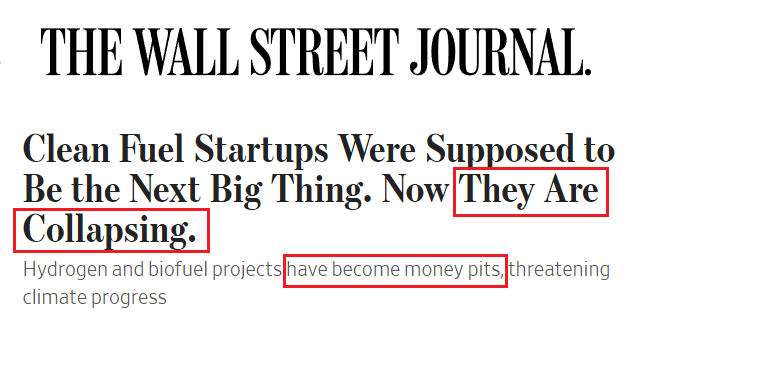The biofuel industry, once heralded as the golden child of renewable energy, is now facing a series of catastrophic failures that underscore its inherent inefficiency and lack of economic viability. The dream of turning agricultural products into clean fuel has been shattered by the harsh realities of economics, technology, and logistics. Despite the grand promises made by industry leaders and policymakers, biofuel companies have struggled to deliver on their claims, leading to a cascade of failures that highlight the fundamental flaws in this sector.
The Biofuel Industry: A Failed Experiment
The concept of biofuels gained significant traction in the early 2000s as a potential solution to reduce carbon emissions and dependence on fossil fuels. Governments around the world, particularly in the United States and Europe, poured billions of dollars into subsidies and incentives to kickstart this industry. The idea was simple: convert crops like corn, soy, and sugarcane into ethanol or biodiesel, which could then be used as cleaner alternatives to gasoline and diesel.
However, the biofuel industry has failed to live up to its hype. Many companies, once considered the darlings of the green energy movement, have gone bankrupt or are on the brink of collapse. The Wall Street Journal article highlights the struggles of these companies, pointing out that
“Startups promising to power planes, ships and trucks with clean fuel are sputtering before they get off the ground, showing how hard it will be to wean many industries off oil and gas.”
“A company backed by United Airlines that raised hundreds of millions of dollars to turn trash into jet fuel appears to have shut down.”
“Another, backed by Airbus, JetBlue and GE Aerospace, that was working on using hydrogen to power planes went bust.”
“Chevron, BP and Shell, meanwhile, are scaling back projects to make biofuels from cooking fats, oils, greases and plant material.”
The Inefficiency of Biofuels
One of the primary reasons for the failure of biofuel companies is the inherent inefficiency of the process. Turning crops into fuel is an energy-intensive process that often results in a net loss of energy. In other words, the amount of energy required to grow, harvest, and process the crops into biofuel can exceed the energy content of the final product. This inefficiency makes biofuels economically unviable without significant government subsidies.
Moreover, the use of food crops for fuel production has raised ethical concerns. The diversion of crops like corn and soy from food production to fuel production has led to higher food prices and food shortages in some parts of the world. This has sparked criticism that biofuels are contributing to global hunger rather than solving the energy crisis.
Economic Realities: The Collapse of Biofuel Companies
The economic realities of the biofuel industry have caught up with many companies, leading to a wave of bankruptcies and closures. The article notes that:
“Many clean-fuel projects have become money pits, in part because of the great amounts of power they need.”
“High interest rates, supply-chain disruptions and expensive power-grid upgrades have driven up electricity prices.”
“This observation is critical because it highlights that the failures are not isolated incidents but rather symptomatic of deeper issues within the industry.”
Several factors have contributed to the economic struggles of biofuel companies. First, the price volatility of oil has made it difficult for biofuels to compete in the market. When oil prices are low, biofuels become less attractive to consumers and investors. Second, the high costs associated with biofuel production have made it challenging for companies to achieve profitability. Even with government subsidies, many biofuel companies have struggled to break even.
“The excitement of the early days has not lived up to the hype,” said Andy Marsh, chief executive of Plug Power, a startup that recently opened one of the country’s first plants making green hydrogen, a potential replacement for fossil fuels in industries such as steel making and chemical production.
Shares of Plug Power have tumbled more than 90% since the passage of the U.S. climate law two years ago. Shares of biofuels startup Gevo, where Marsh is a board member, are down about 80% in that span.
The failures and delays are all but extinguishing the early optimism after the climate law passed. Rising costs have pushed out project timelines and made it more difficult for companies to raise money. The government’s delays in completing tax credits are adding to the challenges.
This is a common theme in the biofuel industry, where ambitious projects often fail to translate into viable business models.
Environmental Concerns: The Myth of Clean Energy
One of the most significant selling points of biofuels has been their potential to reduce greenhouse gas emissions. However, this claim has been increasingly challenged by scientists and environmentalists. The production of biofuels can generate significant carbon emissions, particularly when considering the entire lifecycle of the fuel—from crop cultivation to processing and transportation. This revelation is a critical blow to the industry, as it undermines one of the key arguments in favor of biofuels.
Furthermore, the environmental impact of large-scale biofuel production extends beyond carbon emissions. The intensive farming practices required to produce biofuel crops can lead to deforestation, soil degradation, and water shortages. These environmental costs further diminish the appeal of biofuels as a sustainable energy source.
The Role of Government Subsidies
The biofuel industry has been heavily reliant on government subsidies to stay afloat. These subsidies, often justified on the grounds of promoting green energy and reducing carbon emissions, have propped up an industry that is fundamentally uneconomical. The article highlights that “without government support, many biofuel companies would have gone bankrupt years ago.”
However, the reliance on subsidies has created a dependency that is unsustainable in the long term. As governments face mounting budget pressures and shift their focus to other forms of renewable energy, biofuel companies are finding it increasingly difficult to secure the funding they need to survive. The withdrawal of subsidies has exposed the underlying weaknesses of the biofuel industry, leading to a wave of bankruptcies and closures.
The Future of Biofuels: A Grim Outlook
Given the numerous challenges facing the biofuel industry, the future looks grim. The article concludes that the collapse of the biofuel industry is a cautionary tale for other sectors of the green economy.”
The failure of biofuels highlights the importance of critically evaluating the economic and environmental viability of alternative energy sources before committing significant resources to their development.
The lessons learned from the biofuel industry’s failures should inform future energy policy. Rather than blindly subsidizing technologies that are not economically viable, policymakers should focus on supporting energy solutions that are both efficient and sustainable. The biofuel debacle serves as a warning against the dangers of letting ideology drive energy policy at the expense of sound economic and scientific principles.
Conclusion: The Biofuel Industry’s Legacy of Failure
The biofuel industry was supposed to revolutionize the energy sector by providing a cleaner, more sustainable alternative to fossil fuels. Instead, it has become a cautionary tale of economic and environmental mismanagement. The cascade of failures among biofuel companies underscores the inherent inefficiency and lack of economic sense that has plagued the industry from the start.
This sentiment captures the essence of the biofuel industry’s downfall. Despite the grand promises and billions of dollars in government support, the biofuel industry has failed to deliver a viable alternative to fossil fuels.
In the end, the biofuel experiment has left behind a trail of bankruptcies, environmental degradation, and unfulfilled promises. It serves as a stark reminder that the pursuit of green energy solutions must be grounded in reality, not wishful thinking. As we look to the future of energy, it is crucial to learn from the mistakes of the past and ensure that our energy supply and development is based on sound science and economics, not on ideological fervor.
In conclusion, the biofuel industry’s collapse should prompt a re-evaluation of our approach to energy. Rather than chasing after every new technology that promises to save the planet, we must carefully assess the feasibility and impact of these solutions. The biofuel industry’s legacy of failure is a testament to the importance of critical thinking and skepticism in the development of energy policy.
Source: Watts Up With That




No comments.
By submitting a comment you grant Free West Media a perpetual license to reproduce your words and name/web site in attribution. Inappropriate and irrelevant comments will be removed at an admin’s discretion. Your email is used for verification purposes only, it will never be shared.